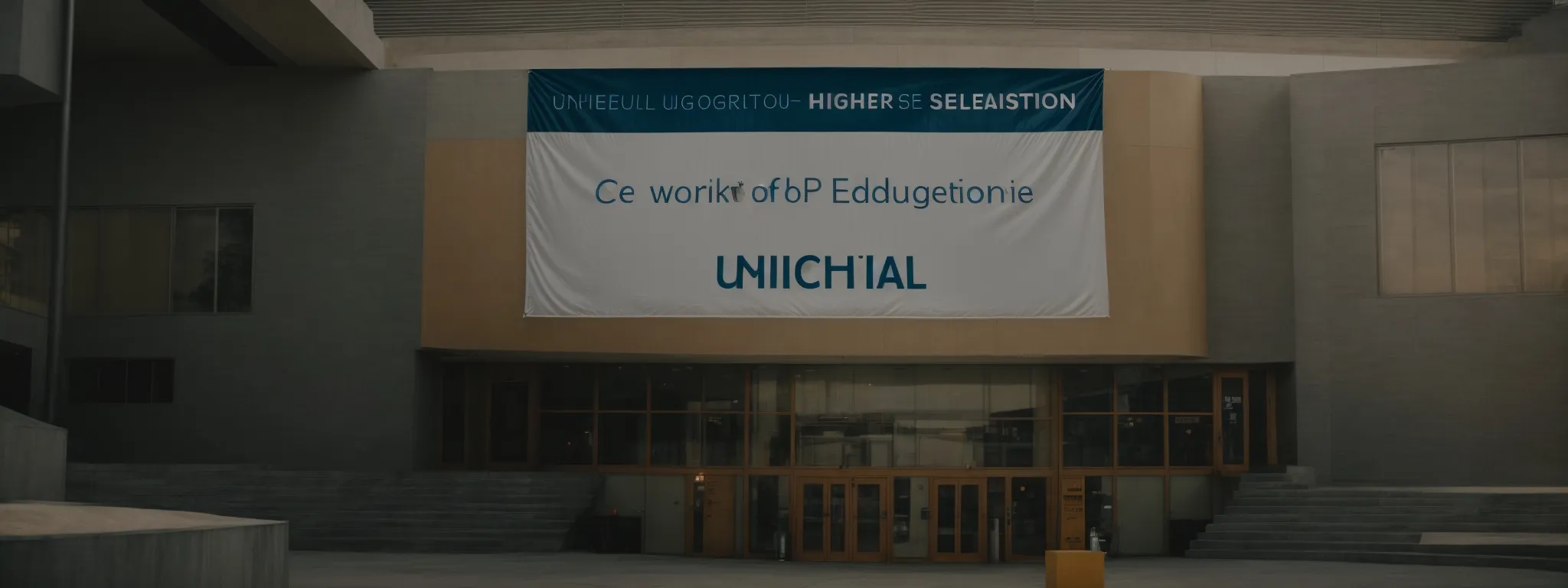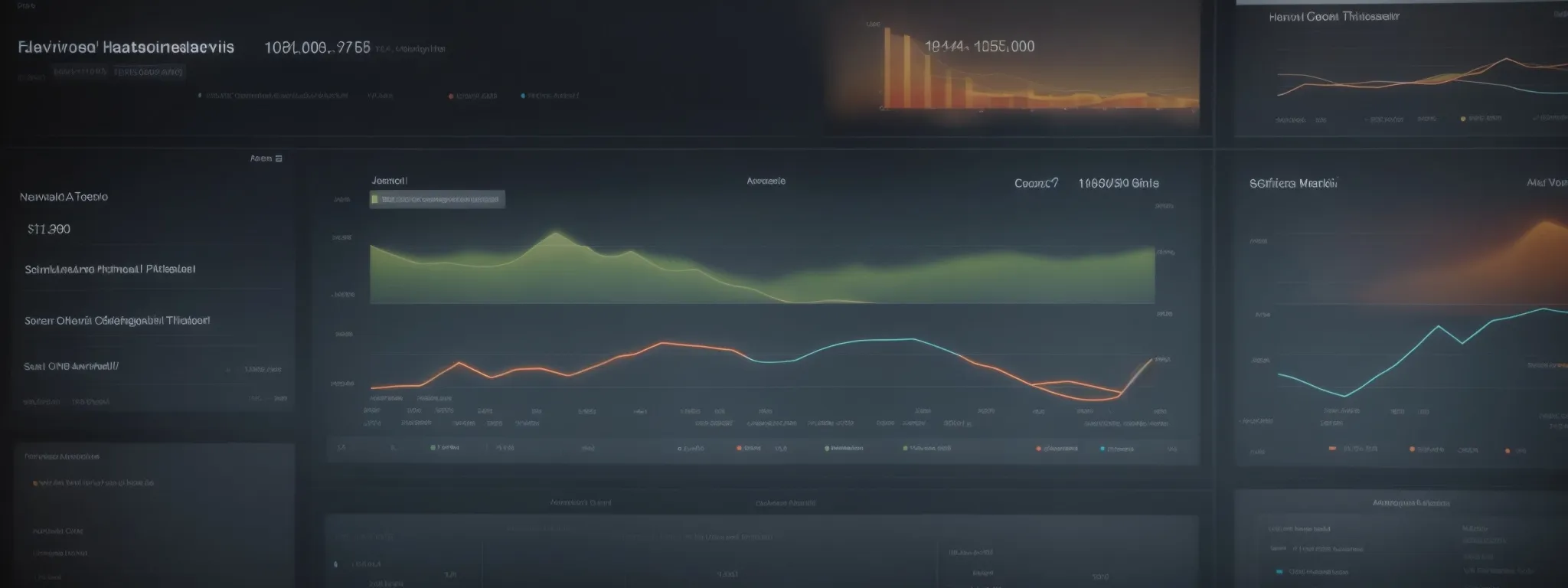Improve College Search Rankings: SEO Best Practices
Maximizing Your College’s Visibility Online: SEO Best Practices for Higher Education Institutions Navigating the digital landscape effectively is critical for higher education institutions aiming to attract prospective […]
Maximizing Your College’s Visibility Online: SEO Best Practices for Higher Education Institutions
Navigating the digital landscape effectively is critical for higher education institutions aiming to attract prospective students and enhance their online authority.
Search Engine Optimization, or SEO, emerges as a beacon, guiding universities to prominence in the competitive terrain of search results.
With targeted keyword strategies, meticulous on-page optimization, and authoritative backlinks, higher education websites can achieve the distinction they deserve.
Through astute Local SEO practices, institutions ground their online presence in the community, strengthening connections and local search dominance.
For a comprehensive guide to outclassing competitors and elevating your institution’s search engine ranking, keep reading.
Key Takeaways
- Higher Education Institutions Can Leverage SEO to Enhance Visibility and Attract Potential Students
- LinkGraph Provides Specialized SEO Services, Such as Audits and White Label Link Building, That Boost Higher Education Websites’ Rankings
- Strategic Keyword Optimization Balances Broad and Niche Terms to Effectively Reach Target Audiences for Academic Programs
- Ongoing Keyword Performance Tracking and SEO Tactics Adaptation Are Crucial for Maintaining Competitive Search Rankings
- Colleges Can Improve Local SEO Presence Through Optimized Google Business Profiles, Community Engagement, and Local Citations
Understanding SEO Fundamentals for Higher Education

The digital era has ushered in a new frontier for higher education institutions, where visibility and searchability on the web are paramount to attracting prospective students.
As these institutions strive to navigate the nuances of search engine algorithms, a profound understanding of Search Engine Optimization (SEO) is imperative.
By elucidating how search engines rank scholarly websites, higher education leaders can harness SEO to amplify their institution’s online presence, thereby augmenting student enrolment.
Grappling with the basics of SEO opens the gateway for colleges and universities to optimize their web content strategically, ensuring that their educational offerings align with the quest of the modern searcher.
Grasping the Basics of SEO for Academic Institutions
Amidst a landscape where a searcher’s query can unveil innumerable academic options, it is crucial for higher education institutions to understand SEO’s role in enhancing their digital footprint. The crux of SEO mastery lies not just in keyword deployment but in the overall orchestration of SEO elements ranging from user experience to content relevance, all tailored to draw the attention of both search engines and prospective students alike.
LinkGraph, with its comprehensive SEO Audit and White Label SEO services, stands out as a specialized ally for universities aiming to calibrate their online content. By leveraging tools like Search Atlas, these institutions can conduct thorough backlink analyses and refine their web content strategies, thereby increasing their authority in search engine result pages and ultimately reaching a wider target audience.
How Search Engines Rank College Websites
When search engines assess university websites, they utilize a comprehensive set of metrics to evaluate relevance and authority. Such metrics include the quality of backlink profiles, the relevance and optimization of content for target keywords, and the overall user experience presented by the site’s navigation and design.
Effective SEO implementation ensures that a higher education institution’s web pages earn a coveted position on search engine result pages (SERPs). This achievement is a direct result of optimizing key elements like the page title, meta descriptions, and employing strategic link building that establishes the institution’s domain as a reputable source of information.
| SEO Element | Function | Impact on SERPs |
|---|---|---|
| Backlink Profile | Evaluates the quantity and quality of incoming hyperlinks. | Boosts domain authority and page ranking. |
| Content Relevance | Measures how well content aligns with searcher intent. | Enhances visibility and user engagement. |
| Page Title and Meta Descriptions | Serves as a concise summary for both users and search engines. | Improves click-through rates and relevance signals. |
| User Experience | Encompasses site speed, navigation ease, and mobile-friendliness. | Reduces bounce rates and promotes longer site visits. |
The Impact of SEO on College Enrollment
The pursuit of higher rankings on search engine result pages directly correlates with the ability of a higher education institution to bolster student enrollment. By employing strategic SEO practices, these institutions position themselves at the very forefront of a searcher’s journey, increasingly their digital visibility and drawing in a targeted audience of potential students.
LinkGraph’s adept utilization of SEO audit tools and White Label Link Building services offers colleges a tangible advantage in the competitive landscape of higher education marketing. Enhanced web presence via SEO not only drives website traffic but fosters significant growth in enrollment numbers by connecting with students who are actively seeking educational opportunities.
Crafting a Keyword Strategy Tailored to Academic Programs

In the quest to secure a prominent online position, higher education institutions must engage in meticulous keyword research, pinpointing high-value search terms to attract their ideal audience.
Crafting a keyword strategy that encompasses both broad and niche terms demands precision, ensuring that academic programs meet the discerning eye of the searcher on a quest for knowledge.
Continual monitoring of keyword performance becomes a critical element, enabling institutions to refine their approach and adapt their tactics in a dynamic digital landscape.
This strategic emphasis on keyword optimization serves as the bedrock of a robust SEO campaign, ultimately positioning colleges to magnify their reach and captivate prospective students amid a sea of digital information.
Identifying High-Value Keywords for College Courses
In the digital age, each higher education institution must judiciously select the keywords that will resonate with their target audience and increase visibility for their specialized courses. At LinkGraph, the specialized focus is placed on identifying those keyword phrases that prospective students use, thus ensuring the academic programs are prominently displayed in Google’s coveted search rankings.
Through Search Atlas, LinkGraph facilitates an intricate process of keyword research that uncovers not only popular search terms but also the niche keywords that set a college apart. This is pivotal in aligning an institution’s marketing strategy with user search behavior, allowing for tailored content that directly addresses the informational needs of future scholars.
Balancing Broad and Niche Keywords for Maximum Reach
Optimizing a college’s search visibility requires a keen balance between broad and niche keywords, managing the dichotomy to capture a comprehensive target audience. Broad keywords draw a larger audience, potentially increasing a site’s visibility and driving significant traffic.
Niche keywords, on the other hand, target specific searcher interests and academic pursuits, often leading to higher engagement and conversion rates among prospective students who are closer to making an enrollment decision. This fine-tuning of keyword selection is a strategic maneuver catered to the institution’s unique offerings:
| Keyword Type | Target | Purpose |
|---|---|---|
| Broad Keywords | General audience | To elevate overall visibility and website traffic |
| Niche Keywords | Specific searcher interests | To enhance engagement and drive conversions |
Deploying this strategic amalgamation of keywords, LinkGraph furnishes higher education institutions with a potent SEO blueprint. Such a methodology ensures that every course and program page aligns deftly with the ever-evolving search behavior of the academic seeker.
Tracking Keyword Performance and Adjusting Tactics
Assiduously monitoring keyword performance marks the cornerstone of an adaptable SEO campaign. Higher education institutions must utilize advanced tools like LinkGraph’s Search Atlas to track the efficacy of their targeted keywords, ensuring their web pages continue to meet searcher demand and maintain high search engine rankings.
Following the analysis, academic institutions must promptly adapt their SEO tactics. This iterative process is essential to outperforming competitors and capitalizing on emergent search trends that resonate with the contemporary student body.
| SEO Activity | Purpose | Outcome for Academic Institutions |
|---|---|---|
| Keyword Performance Monitoring | To gauge the effectiveness of targeted search terms. | Ensures content remains relevant and competitive in SERPs. |
| SEO Tactics Adaptation | To refine SEO strategies based on keyword analytics. | Aligns marketing efforts with evolving search behaviors. |
On-Page SEO Optimization for Educational Content

Embracing on-page SEO is a critical step for higher education institutions aiming to optimize their online content and bolster website performance.
This facet of SEO strategy delves into the composition and presentation of a college’s digital offerings, ensuring they are constructed to meet the algorithmic preferences of search engines.
From the meticulous arrangement of content with headers that segment information clearly, to the strategic placement of meta tags that succinctly summarize page content, every aspect contributes to a more coherent and searchable online presence.
Further, addressing technical factors such as site speed and mobile responsiveness is central to providing an exemplary user experience, a component that greatly influences an institution’s online rank and visibility to the target audience.
Structuring Content for Enhanced SEO Performance
Mastering On-Page SEO Optimization requires higher education institutions to approach their content structuration with precision and intentionality. By embedding targeted keywords within the first 100 words and maintaining a coherent URL structure, these institutions ensure that their program pages are not only informative but also easily discoverable by search engines and prospective students.
LinkGraph’s expertise in on-page SEO services encourages the judicious use of internal links, with anchor text that clearly signals the page’s value to both users and search engine crawlers, enhancing the intricacy of the institution’s SEO canvas. The implementation of a well-considered Content Strategy, augmented by Search Atlas’ capabilities, lays the foundation for educational content that resonates in search rankings and meets the needs of the academic audience.
Utilizing Headers and Meta Tags Effectively
Accurate use of headers and meta tags serves as a navigational beacon for search engines, guiding them through a college’s digital content and enhancing the site’s relevance for target keywords. Incorporating headers that reflect key sections of an educational institution’s web pages not only makes content digestion smoother for users, but it also signals the importance of topics covered, improving the site’s organization and search performance.
In the realm of on-page SEO, meta tags play a pivotal role in summarizing a college’s value proposition, encapsulating the essence of the web page for search engines and prospective users alike. The robust implementation of descriptive, keyword-rich title tags and meta descriptions crafted by LinkGraph helps to elevate the academic programs’ attractiveness on the search engine results pages, thereby optimizing click-through rates and fostering a bridge between the institution and its future students.
Improving Site Speed and Mobile Responsiveness
In the competitive arena of higher education, a swift and responsive website is not merely a convenience but a necessity. By prioritizing site speed and adopting responsive design, LinkGraph ensures that university websites are primed for performance, engaging students seamlessly across all devices, which is integral to maintaining prominence in local and global search engine rankings.
LinkGraph’s acumen in SEO extends to optimizing the technical facets that influence user experience. By addressing load times and device compatibility, academic institutions can significantly diminish bounce rates, thereby resonating with the expectations of today’s digitally-savvy students and securing a higher stature in search engine result pages.
Building Quality Backlinks to Boost College Reputation

In an age where a strong digital presence is a linchpin for institutional success, higher education entities must employ shrewd strategies to bolster their reputation and extend their educational outreach.
A potent avenue for raising a college’s profile involves the cultivation of quality backlinks, a critical element in asserting the institution’s domain authority and prominence in search engine rankings.
By implementing a nuanced link-building strategy specifically tailored for .edu sites, institutions elevate their status within the academic community.
This strategic move, enhanced by leveraging academic partnerships and networks, not only widens their scope of influence but also manifests as a stamp of credibility in the eyes of search engines.
Additionally, guest blogging and establishing scholarly collaborations with educational authorities garners esteem and underpins the institution’s connection with the broader educational ecosystem.
Each of these tactics plays a pivotal role in sculpting a college’s online visibility and fostering a reputable digital environment conducive to academic excellence and growth.
Implementing a Link-Building Strategy for .Edu Sites
Incorporating LinkGraph’s White Label Link Building expertise, educational institutions can architect a robust link-building strategy that emphasizes the unique value of .edu domains. Such a strategic approach carefully orchestrates the acquisition of authoritative hyperlinks from reputable sources within the academic and research communities, thereby fortifying the institution’s standing in SERPs and enhancing its scholarly prestige.
LinkGraph’s suite of SEO tools, including Search Atlas, equips universities with the ability to identify and secure backlinks that not only expand their reach but also complement their existing educational resources. This tailored link-building strategy is pivotal for educational websites to not just attract backlinks, but to do so in a way that underscores the institution’s commitment to providing quality education and valuable information.
Leveraging Academic Partnerships and Networks
In the realm of digital ascendancy, educational institutions can significantly magnify their online reputation by synergizing with academic alliances and research networks. LinkGraph’s adept SEO services facilitate the establishment of such collaborative ties, effectively amplifying the reach and domain authority of college websites through shared scholarly endeavors and reciprocal backlinking.
Equipped with the ingenuity of LinkGraph’s SEO strategies, higher education institutions can transform alliances into digital assets. Cultivating relationships with scholarly publications, reputable educational platforms, and industry-specific organizations results in a fortified network of backlinks, casting a broader net of visibility for the institution in the academic digital ecosystem.
Guest Blogging and Collaborating With Educational Authorities
Embracing guest blogging and forging collaborations with respected educational authorities serves as a strategic lever for expanding a college’s digital influence. Higher education institutions benefit from LinkGraph’s Guest Posting Services, which open avenues for sharing expertise through authoritative platforms, thereby enhancing their educational brand and ability to attract quality backlinks.
Through LinkGraph’s strategic partnerships, colleges can contribute thought leadership in the form of scholarly articles and insightful content to reputable educational publications. Such collaborations present invaluable opportunities for higher education institutions to underline their academic credentials and deepen their connection with the wider educational community, vital in today’s search-centric world.
Enhancing Local SEO for Community-Focused Institutions

In an age where competition for attention is fierce, especially in the digital space, community-focused higher education institutions must recognize the importance of localized search engine optimization (SEO).
Tapping into the local ecosystem presents a tremendous opportunity for colleges to increase their relevance and presence in the immediate geographic area.
Careful optimization of a Google My Business profile, fostering local reviews and citations, and active participation in community events are strategic moves that significantly enhance a college’s local SEO footprint.
These efforts ensure that they not only gain prominence in local search results but also build a robust connection with the community they aim to serve.
Claiming and Optimizing Google My Business for Colleges
LinkGraph recognizes the pivotal role that a proficiently managed Google Business Profile plays in fortifying a college’s infrastructure for Local SEO. They advocate for higher education institutions to claim and meticulously refine their profiles, employing up-to-date information and imagery that mirrors the college’s ethos and academic environment, thus enhancing visibility in local search results.
Through precise targeting and detailed attention to SEO elements, such as the inclusion of relevant categories and strategic keywords, LinkGraph enables colleges to optimize their Google Business Profile. This ensures the institution’s presence is robust in local search queries, fostering a connection with the surrounding community and prospective students searching for nearby educational opportunities.
Encouraging Local Reviews and Citations
For colleges aiming to carve a niche within their local communities, generating an influx of local reviews and citations marks a strategic endeavor with considerable benefits. LinkGraph’s local SEO expertise guides institutions in facilitating and nurturing an environment that encourages students, alumni, and faculty to share their positive experiences on various review platforms, thus significantly bolstering the institution’s credibility and prominence in localized search inquiries.
Citations, which include mentions of a college’s name, address, and phone number on other web pages, are imperative for validating the institution’s standing within the local area. LinkGraph assists colleges by ensuring accurate and consistent listings across directories and educational platforms, enhancing the institution’s local SEO profile and amplifying its visibility in community-centric searches.
Participating in Community Events for Local SEO Benefits
Active engagement in local community events offers a tangible edge in bolstering a college’s local SEO footprint. By participating in fairs, seminars, and educational outreach programs, institutions create opportunities to be featured on local listings and event calendars, enriching their local backlink profile.
Cultivating a presence at such events allows institutions to be indexed more prominently on local search engine results, making them more accessible to the community they serve. These occurrences should be highlighted on the college’s digital platforms, displaying a commitment to community involvement:
| Local Partnership | Type of Event | SEO Benefit |
|---|---|---|
| City Council Education Fair | Educational Fair | Enhanced local listings and community engagement |
| Regional Science and Innovation Expo | Seminar/Expo | Increased backlinks from event organizers and participants |
| Annual Community College Open House | Open House | Augmented visibility in local search results and college reputability |
Measuring and Analyzing SEO Success in Educational Contexts

In the dynamic landscape of higher education, the digital prowess of a college is measured not merely by its curriculum offerings but by its online visibility and search engine optimization (SEO) maturity.
To stay competitive and prominent in the vast digital realm, institutions must be diligent in measuring and analyzing the effectiveness of their SEO efforts.
Establishing robust analytics to monitor visitor behavior, conducting regular SEO audits to pinpoint areas for improvement, and staying agile with updates to SEO practices in response to algorithm changes are essential to ensuring that a college’s virtual footprint resonates with both search engines and prospective students.
These focused measures form the backbones of a sustainable SEO strategy, fostering an enduring online presence that drives academic engagement and growth.
Setting Up Analytics to Track Visitor Behavior
In the echelons of higher education, deploying analytics to scrutinize visitor behavior is a critical step toward gauging the impact of a college’s SEO strategy. LinkGraph’s expertise extends to setting up advanced tracking mechanisms, enabling institutions to understand how students interact with their online content and the paths they take towards enrollment.
By capturing and analyzing web traffic data, colleges gain insightful metrics on page views, session duration, and user flow. This intelligence, powered by Search Atlas, allows educational institutions to fine-tune their web strategies, ensuring they align with the expectations and needs of their target audience, thereby maximizing online visibility and reach.
Regular SEO Auditing to Identify Improvement Areas
Conducting regular SEO audits stands as a cardinal operation for higher education institutions seeking to underscore weak spots and capitalize on untapped opportunities. LinkGraph’s detailed SEO audit services afford educational clients a meticulous analysis of their online assets, thereby identifying both technical issues and potential enhancements in content strategy.
Armed with the insights from these thorough evaluations, universities can pivot their SEO strategies to address the nuances of ever-evolving search engine algorithms. This proactive stance ensures that the institution’s digital presence is not only current but also primed for maximum search engine visibility and user engagement.
Adapting to Algorithm Changes and Keeping SEO Practices Up-to-Date
In an ever-changing digital landscape, the vitality of a higher education institution’s online presence is heavily contingent upon its adaptability to search engine algorithm updates. LinkGraph champions the essential practice of continuous SEO education and updates, ensuring that the digital marketing strategies employed by colleges remain in lockstep with the latest trends and algorithmic shifts, thus safeguarding their search rankings and online visibility.
Staying abreast of the latest SEO developments is not just about maintaining existing search engine rankings; it is a proactive measure to anticipate future algorithmic trends. Institutions that partner with LinkGraph can expect to receive expert guidance on how to pivot their SEO strategies swiftly and effectively, allowing them to consistently meet the demands of both search engines and prospective students in the most efficient manner.
Frequently Asked Questions
How can higher education institutions benefit from implementing SEO practices?
Higher education institutions can leverage SEO practices to significantly enhance their online visibility, drawing a larger audience of prospective students to their program pages and boosting student enrolment. By optimizing their websites for search engine ranking, these institutions will not only improve user experience but also establish authority within the educational digital space, fostering trust and engagement from their target audience.
What are the key elements to consider when creating a keyword strategy for academic programs?
Creating an effective keyword strategy for academic programs hinges on understanding the target audience’s search behavior and aligning with the institution’s core objectives, ensuring keywords are relevant to both prospective students and their parents. It involves meticulous research to pinpoint terms they are likely to use when seeking information on higher education offerings and a keen insight into the competitive landscape to identify unique keywords that can drive qualified traffic to a university website.
How can on-page SEO optimization improve the visibility of educational content?
On-page SEO optimization elevates the visibility of educational content by enhancing its relevance to search queries and improving user experience, both of which are pivotal considerations for search engines when ranking pages. Implementing strategic elements like keyword-rich page titles, comprehensive meta descriptions, and well-organized headers, LinkGraph’s expert services ensure that content not only attracts but also retains the attention of a target audience, which often includes students, educators, and institutions in the realm of higher education.
What are the strategies for building quality backlinks to enhance a college’s online reputation?
LinkGraph specializes in constructing comprehensive SEO strategies that involve white label link building, intricately targeting backlinks from reputable and authoritative sources, all intended to augment the online reputation of colleges. Their suite of services encompasses meticulous Backlink Analysis and bespoke content strategies aimed at elevating the prominence of higher education institutions in search rankings.
Why is local SEO important for community-focused higher education institutions?
Local SEO is imperative for community-focused higher education institutions as it positions them prominently in local search results, directly influencing student enrolment by targeting the geographically relevant audience. This specialized approach to search engine optimization ensures an institution’s visibility to potential students and parents seeking educational opportunities within their locale, thus bolstering both the institution’s authority and its connection with the community it serves.
Conclusion
Maximizing a college’s online visibility through adept SEO practices is crucial in today’s digital landscape.
It not only enhances the institution’s search engine rankings but is also instrumental in increasing student enrollment.
Colleges must prioritize crafting a keyword strategy that captures both broad audience interest and niche academic pursuits.
Effective on-page optimization, including well-structured content, headers, and meta tags, improves user experience and search engine relevancy.
Establishing a strong backlink profile through strategic link-building and leveraging academic partnerships elevates a college’s reputation and authority.
Local SEO tactics, such as optimizing Google My Business profiles and engaging in community events, further solidify the institution’s presence in the local area.
Continuous measurement and analysis of SEO strategies ensure they remain effective in the face of algorithm updates, securing the college’s prominence in the competitive higher education market.














































































